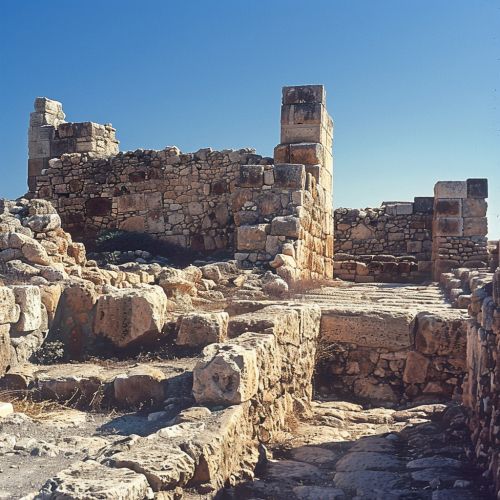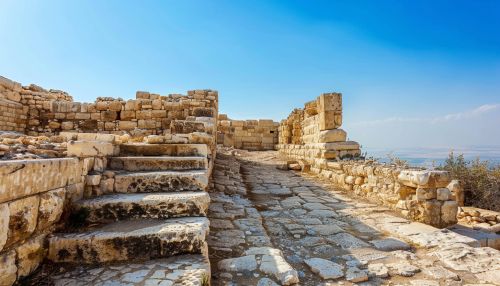History of Israel: Difference between revisions
(Created page with "== Ancient Israel == The history of Israel dates back to ancient times, with its earliest roots found in the Bronze Age. The region known as Canaan was inhabited by various Semitic-speaking peoples, including the Canaanites, Amorites, and Hittites. The Hebrews, a group of Semitic tribes, began to settle in the region around the 13th century BCE. According to biblical tradition, the Patriarchs—Abraham, Isaac, and Jacob—are consider...") |
No edit summary |
||
| Line 11: | Line 11: | ||
The period of the [[United Monarchy]] began around 1020 BCE with the reign of [[Saul]], the first king of Israel. Saul was succeeded by [[David]], who established [[Jerusalem]] as the capital and expanded the kingdom's territory. David's son, [[Solomon]], is renowned for building the [[First Temple]] in Jerusalem, a central place of worship for the Israelites. | The period of the [[United Monarchy]] began around 1020 BCE with the reign of [[Saul]], the first king of Israel. Saul was succeeded by [[David]], who established [[Jerusalem]] as the capital and expanded the kingdom's territory. David's son, [[Solomon]], is renowned for building the [[First Temple]] in Jerusalem, a central place of worship for the Israelites. | ||
[[Image:Detail-96181.jpg|thumb|center|Ancient ruins of a stone structure in Israel, with clear blue skies in the background.|class=only_on_mobile]] | |||
[[Image:Detail-96182.jpg|thumb|center|Ancient ruins of a stone structure in Israel, with clear blue skies in the background.|class=only_on_desktop]] | |||
=== The Divided Kingdom === | === The Divided Kingdom === | ||
Latest revision as of 09:59, 4 July 2024
Ancient Israel
The history of Israel dates back to ancient times, with its earliest roots found in the Bronze Age. The region known as Canaan was inhabited by various Semitic-speaking peoples, including the Canaanites, Amorites, and Hittites. The Hebrews, a group of Semitic tribes, began to settle in the region around the 13th century BCE. According to biblical tradition, the Patriarchs—Abraham, Isaac, and Jacob—are considered the founding fathers of the Israelite nation.
The Exodus and Conquest
The Exodus from Egypt, led by the prophet Moses, is a central event in Israelite history. This migration, which is believed to have occurred in the 13th century BCE, marks the beginning of the Israelites' journey to the Promised Land. Following the Exodus, the Israelites wandered in the desert for 40 years before conquering Canaan under the leadership of Joshua.
The United Monarchy
The period of the United Monarchy began around 1020 BCE with the reign of Saul, the first king of Israel. Saul was succeeded by David, who established Jerusalem as the capital and expanded the kingdom's territory. David's son, Solomon, is renowned for building the First Temple in Jerusalem, a central place of worship for the Israelites.


The Divided Kingdom
After Solomon's death around 930 BCE, the kingdom split into two: the northern kingdom of Israel and the southern kingdom of Judah. The northern kingdom was eventually conquered by the Assyrian Empire in 722 BCE, leading to the dispersion of the Ten Lost Tribes. Judah survived until 586 BCE, when it was conquered by the Babylonian Empire, and the Babylonian Exile began.
Second Temple Period
Return from Exile
In 539 BCE, the Persian Empire under Cyrus the Great conquered Babylon and allowed the exiled Jews to return to Judah. This period saw the construction of the Second Temple in Jerusalem, completed in 516 BCE. The returnees re-established their community and religious practices, which were centered around the Temple.
Hellenistic Influence
The conquest of the Persian Empire by Alexander the Great in 332 BCE introduced Hellenistic culture to the region. This period saw significant cultural and political changes, including the spread of Greek language and customs. The Hasmonean Dynasty emerged in the 2nd century BCE following the Maccabean Revolt against the Seleucid Empire, leading to a brief period of Jewish independence.
Roman Rule
In 63 BCE, the Roman general Pompey conquered Jerusalem, and the region became a client state of the Roman Republic. The Herodian Dynasty, established by Herod the Great, ruled as Roman client kings. Herod is known for his extensive building projects, including the expansion of the Second Temple.
Late Antiquity and Early Middle Ages
Jewish-Roman Wars
The First Jewish–Roman War (66–73 CE) resulted in the destruction of the Second Temple in 70 CE. The Bar Kokhba revolt (132–136 CE) led to further devastation and the expulsion of Jews from Jerusalem. The Romans renamed the region Syria Palaestina and Jerusalem became Aelia Capitolina.
Byzantine Period
The Byzantine Empire controlled the region from the 4th to the 7th centuries CE. During this time, Christianity became the dominant religion, and numerous churches and monasteries were built. Jewish communities continued to exist, albeit under restrictive conditions.
Islamic and Crusader Periods
Early Islamic Period
In the 7th century CE, the region was conquered by the Rashidun Caliphate, marking the beginning of Islamic rule. The Umayyad and Abbasid caliphates oversaw the construction of significant Islamic landmarks, including the Dome of the Rock and the Al-Aqsa Mosque in Jerusalem.
Crusader Kingdom
The First Crusade (1096–1099) led to the establishment of the Kingdom of Jerusalem, a Crusader state. The Crusaders controlled the region until 1187, when Saladin recaptured Jerusalem. The Crusader presence continued in some coastal cities until the late 13th century.
Ottoman Period
The Ottoman Empire conquered the region in 1517 and ruled it for four centuries. During this period, the region was divided into several administrative districts. The Ottomans implemented various reforms, including land registration and tax collection systems. Jewish communities in Safed, Jerusalem, and Hebron flourished during this time.
Modern Period
British Mandate
Following the defeat of the Ottoman Empire in World War I, the League of Nations granted the British Mandate for Palestine in 1920. The mandate period saw significant Jewish immigration and the development of the Zionist movement, which sought to establish a Jewish homeland in Palestine.
Establishment of the State of Israel
On May 14, 1948, the Declaration of the Establishment of the State of Israel was proclaimed by David Ben-Gurion. The declaration led to the 1948 Arab-Israeli War, resulting in the establishment of Israel as an independent state. The 1949 Armistice Agreements defined the borders of the new state.
Subsequent Conflicts and Peace Efforts
Israel has been involved in several major conflicts, including the Six-Day War (1967), the Yom Kippur War (1973), and various conflicts with neighboring countries and Palestinian groups. Peace efforts, such as the Camp David Accords (1978) and the Oslo Accords (1993), have aimed to resolve the ongoing Israeli-Palestinian conflict.
